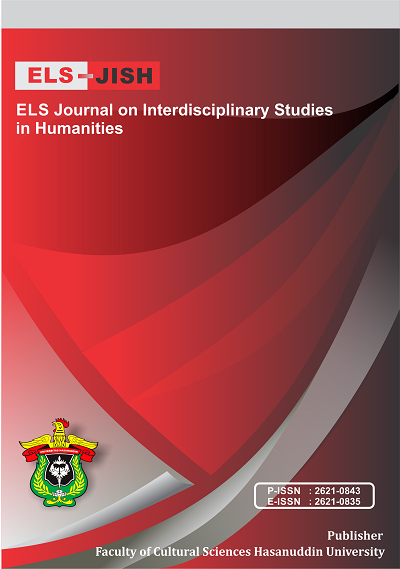Polite Imperative Structures in the Kaledupa Dialect: An Examination of Wakatobi Language
DOI:
https://doi.org/10.34050/elsjish.v7i2.35428Keywords:
Politeness, Imperative, Wakatobi Language, Kaledupa DialectAbstract
This research delves into the intricacies of imperative politeness within the Kaledupa dialect of the Wakatobi language (KDWL), focusing on both its forms and influencing factors. By employing a descriptive qualitative approach from a pragmatic perspective, the study meticulously gathers data through observation, moderate participatory recording, and note-taking techniques. The findings indicate that politeness in KDWL imperatives is manifested through several linguistic features: the length of utterances, the structuring of speech where non-imperative information often precedes the imperative command, variations in intonation, and the use of kinesic signals such as gestures. These elements combine to create a nuanced system of politeness that is sensitive to the context in which the imperative is delivered. Moreover, the study identifies a range of social and cultural factors that influence how politeness is expressed in KDWL imperatives. These include power dynamics and social status, which dictate the level of formality and deference required; kinship and social relationships, which influence the degree of familiarity or respect in the language used; and group membership and gender, which further modulate the appropriateness of certain forms. Additionally, the nature of the speech situation, the role of customary institutions, and adherence to cultural norms play significant roles in shaping polite imperatives. Indecisiveness also emerges as a factor, suggesting that the speaker’s confidence can impact the politeness strategy employed. Together, these findings underscore the complex interplay between linguistic and social elements in the KDWL, providing a comprehensive understanding of how politeness is constructed and maintained in this linguistic community.
References
Andini, C., Yassi, A. H., & Sukmawaty. (2021). The use of honorifics in English and Buginese with special reference to bone language: A comparative study. International Journal of Innovative Science and Research Technology, 6(7), 873-877.
Dewi, R. (2019). Pragmatik: Antara Teori dan Praktik Berbahasa. Yogyakarta: Penerbit Deepublish.
Karubaba, S., Machmoed, H., Rahman, F., & Kamzinah, K. (2024, May). Comparison of Pronominal Systems in Yapen Languages. In 4th International Conference on Linguistics and Culture (ICLC-4 2023) (pp. 360-374). Atlantis Press.
Nurjamily, W. O. (2015). Kesantunan Berbahasa dalam Lingkungan Keluarga (Kajian Sosiopragmatik). Jurnal Humanika, 15(3), 1–11. https://doi.org/10.3923/ijss.2017.32.38
Prihandoko, L. A., Tembang, Y., Marpaung, D. N., & Rahman, F. (2019). English language competence for tourism sector in supporting socio-economic development in Merauke: A Survey Study. In IOP Conference Series: Earth and Environmental Science (Vol. 343, No. 1, p. 012170). IOP Publishing.
Pusat Bahasa Kemdikbud. (2022). Kamus Besar Bahasa Indonesia ( KBBI ). Kementerian Pendidikan Dan Budaya.
Rahardi, R. K. (2019). Pragmatik Kesantunan Imperatif Bahasa Indonesia. Pustaka Pelajar.
Rahman, F. (2016). The Strategy of Teaching Literature through Language-based Methods: A Communicative Approach. In Annual Seminar on English Language Studies (Vol. 1, pp. 156-170).
Rahman, F. F., Ahmad, T. W. B., Badaruddin, S., & Andini, C. (2023). Moral Values in the Film Not One Less《 一个都不能少》 张艺谋对《 一个都不能少》 电影道德价值分析. ELS Journal on Interdisciplinary Studies in Humanities, 6(2), 376-390.
Ramaniyar, E. (2017). Analisis Tuturan Imperatif Dalam Bahasa Melayu Dialek Sintang Kecamatan Serawai Kajian Pragmatik. Jurnal Pendidikan Bahasa, 6(2), 194–208.
Sailan, Z. (2014). Solidaritas dan Kesantunan Berbahasa (Telaah Pragmatik). Pidato Ilmiah.
Sinaga, A. R. (2024). Analysis of Impoliteness Comments of Netizen on Najwa Shihab YouTube Channel. De_Journal (Dharmas Education Journal), 5(1), 96-103.
Susiati, S. (2018). Homonim bahasa kepulauan tukang besi dialek kaledupa di kabupaten wakatobi [the homonymon of tukang besi island languange in kaledupa dialect at wakatobi regency]. Totobuang, 6(1), 109, 123.
Susiati, S. (2018). Kesantunan Imperatif Bahasa Indonesia Suku Bajo Sampela: Kajian Pragmatik. Kongres Bahasa Indonesia, 417–434.
Susilaningtyas, R. D., Wibisono, B., & Suyanto, B. (2017). Kesantunan Imperatif pada Masyarakat Madura di Pasar Ikan Desa Kota Kulon Kabupaten Bondowoso. SEMIOTIKA: Jurnal Ilmu Sastra Dan Linguistik, 18(2), 53–64. https://doi.org/10.19184/semiotika.v18i2.6324
Wibowo, S. E. (2013). Kesantunan Humor Pejabat dalam Wawancara: Kajian Pragmatik (Studi Kasus Wawancara Dahlan Iskan dengan Vivanews). Publikasi Ilmiah.
Yaumi, M. T. A. H., Rahman, F., & Sahib, H. (2024). Bridging Language and Technology through Semiotic Technology. International Journal of Social Science Research and Review, 7(1), 52-61.
Youngsun, K., Sosrohadi, S., Andini, C., Jung, S., Yookyung, K., & Jae, P. K. (2024). Cultivating Gratitude: Essential Korean Thankfulness Phrases for Indonesian Learners. ELS Journal on Interdisciplinary Studies in Humanities, 7(2), 248-253.
Zamzani. (2010). Pengembangan Alat Ukur Kesantunan Bahasa Indonesia dalam Interaksi Sosial Bersemuka dan Non Bersemuka. Laporan Penelitian Hibah Bersaing (Tahun Kedua), 74–86.
Downloads
Published
How to Cite
Issue
Section
License
Copyright (c) 2024 Rima Rima, Susiati Susiati, La Ode Achmad Suherman

This work is licensed under a Creative Commons Attribution-ShareAlike 4.0 International License.






